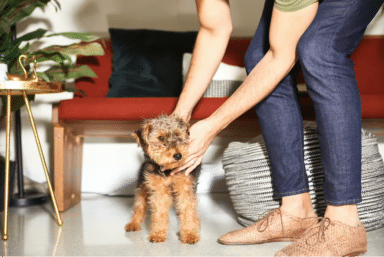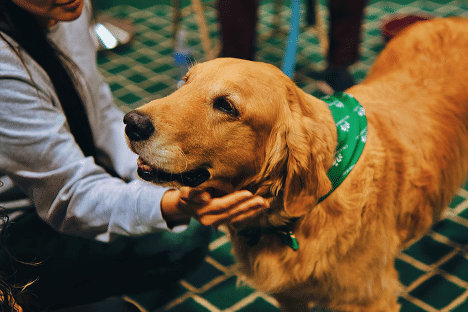

This therapist directory is offered in partnership with BetterHelp. If you sign up for therapy after clicking through from this site, HelpGuide will earn a commission. This helps us continue our nonprofit mission and continue to be there as a free mental health resource for everyone.
Need to talk to someone now? Find a crisis helpline
If you're a BetterHelp therapist with questions about your directory listing, please contact therapists@betterhelp.com
An emotional support dog can help ease the symptoms of mental health conditions such as anxiety and depression. While they don’t require specific training, certain breeds are more suitable as emotional support animals.

An emotional support animal (ESA) can provide comfort, companionship, and therapeutic benefits if you’re facing an emotional or mental health challenge, such as anxiety, panic attacks, depression, chronic stress, ADHD, or post-traumatic stress disorder (PTSD). ESAs are usually dogs (but not always). Under federal law in the United States, to qualify as an emotional support animal, you require a prescription letter from a licensed mental health professional, such as a psychiatrist, psychologist, or therapist.
Unlike service dogs, emotional support dogs don’t require any specific training and can theoretically be any breed (or mix of breeds) you choose. However, if you’re looking for a new dog to serve as an emotional support animal, there are certain breeds that can make the best candidates as emotional support animals.
While any breed of dog can help improve your health, mood, and quality of life, some breeds also make good candidates for emotional support animals.
The following guidelines examine the most suitable breeds for emotional support dogs, as well as some tips to help you choose the one that’s right for you.
Known for their friendly and gentle nature, Golden Retrievers are highly sociable and compassionate dogs. They have a natural instinct to comfort and connect with people. At the same time, they tend to be very easy to train and are one of the most reliable breeds out there.
For this reason, Golden Retrievers are often trained as service dogs. They are also a great option for those in need of emotional support. If you’ve never owned a dog before, Golden Retrievers are a great place to start.
Labradors are renowned for their loyalty, kindness, and affection. They have an innate ability to sense emotions and provide unconditional love to their owners. Labradors are not only great emotional support animals but also versatile service dogs. Their friendly disposition and adaptability make them well-suited for various environments and situations.
Although they might appear very similar, Labrador Retrievers have a shorter coat than Golden Retrievers which is a bit easier to maintain. There is also a difference in character: where Goldens can be a bit “clingy”, Labradors are more independent.
These small yet charming dogs are known for their gentle and affectionate nature. They form strong bonds with their owners and thrive on close companionship.
Cavalier King Charles Spaniels are well-suited for individuals seeking a smaller breed. They are particularly attuned to human emotions, making them excellent, empathetic companions for emotional support.
Poodles are highly intelligent and have a calm and composed demeanor. They are not only hypoallergenic but also adaptable, making them a great choice for those with allergies.
Poodles come in various sizes, from standard to miniature, allowing individuals to choose a size that fits their living situation. Their keen intelligence enables them to provide both emotional support and assist with various tasks.
However, it’s important to note that poodles are typically high-energy dogs that need lots of attention, and both physical and mental stimulation.
Pugs are known for their playful and affectionate nature. They have a charming personality that can bring joy and comfort to their owners. Pugs are small in size but big in heart. They are particularly suitable for individuals looking for a breed with a strong sense of companionship and a knack for lifting spirits.
Shih Tzus might be small, but they have big hearts. They thrive on human companionship and are well-suited for indoor living. With their long, flowing coats and expressive eyes, Shih Tzus make excellent emotional support animals. They are attentive, loving, and have a knack for forming deep bonds with their owners.
Shih Tzus also tend to be quite comfortable living in smaller spaces, so if you live in a one-bedroom apartment, for example, this is a good bread to consider.
It’s important to remember that an emotional support dog is not just a therapeutic tool, but also a pet in every sense of the word. When you decide to welcome a new dog into your life, you’ll basically be getting a new family member. For this reason, it’s important to choose a breed that matches your lifestyle as well as your emotional needs.
[Read: Choosing the Right Dog: Find Your Perfect Canine Friend]
Here are some factors to consider:
Temperament and personality: Each breed comes with different personality traits, so try and find one that will match up with your needs. For example, a Golden Retriever typically has a calming presence, while a Pug will always lift up your spirits.
Energy level: This is an important but often overlooked factor when choosing a dog. High-energy breeds need to get their daily dose of mental and physical stimulation. If you aren’t able to provide that, they may begin acting up in a variety of ways. So, think about how much exercise you are willing to provide for your dog and choose the breed accordingly.
Size: Size probably shouldn’t be the determining factor when choosing a dog, but it’s definitely worth thinking about. More than anything, you need to have enough space for your dog in your home. For example, Golden Retrievers and Labradors will thrive if they have a lot of space and preferably an outdoor area. On the other hand, a Shih Tzu or a Pug might be perfectly happy in a tiny apartment as well.
Grooming requirements: Some breeds need much more maintenance than others. Long-haired breeds need frequent brushing, and some (like Poodles) definitely benefit from regular trips to the groomer. If you are not ready to invest time in these activities, consider a low-maintenance breed, like a Labrador, for example.
Personal connection: Last but not least, never underestimate the sense of connection you can feel with a specific dog. No matter the breed, dogs do have individual personalities. Try to spend time with different dogs and see what your gut tells you.
BetterHelp is an online therapy service that matches you to licensed, accredited therapists who can help with depression, anxiety, relationships, and more. Take the assessment and get matched with a therapist in as little as 48 hours.
Take Assessment HelpGuide is user supported. We earn a commission if you sign up for BetterHelp’s services after clicking through from this site. Learn moreMillions of readers rely on HelpGuide.org for free, evidence-based resources to understand and navigate mental health challenges. Please donate today to help us save, support, and change lives.
Donate to HelpGuide.org today